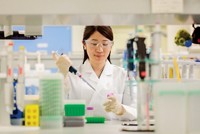Advertisement
Grab your lab coat. Let's get started
Welcome!
Welcome!
Create an account below to get 6 C&EN articles per month, receive newsletters and more - all free.
It seems this is your first time logging in online. Please enter the following information to continue.
As an ACS member you automatically get access to this site. All we need is few more details to create your reading experience.
Not you? Sign in with a different account.
Not you? Sign in with a different account.
ERROR 1
ERROR 1
ERROR 2
ERROR 2
ERROR 2
ERROR 2
ERROR 2
Password and Confirm password must match.
If you have an ACS member number, please enter it here so we can link this account to your membership. (optional)
ERROR 2
ACS values your privacy. By submitting your information, you are gaining access to C&EN and subscribing to our weekly newsletter. We use the information you provide to make your reading experience better, and we will never sell your data to third party members.
Business
Two Japanese Drug Firms Merge
Deal uniting Mitsubishi Pharma, Tanabe is Japanese drug industry's third in two years
by Jean-François Tremblay
February 8, 2007
NOTE: Figures are for fiscal 2005, converted at current exchange rate of $1.00 U.S. = 120.4 yen. SOURCES: Japan Pharmaceutical Manufacturers Association Data Book 2007, company data

NOTE: Figures are for fiscal 2005, converted at current exchange rate of $1.00 U.S. = 120.4 yen. SOURCES: Japan Pharmaceutical Manufacturers Association Data Book 2007, company data
Mitsubishi Pharma, Japan's ninth largest drug firm, and Tanabe Seiyaku, the 11th largest, have reached a basic merger agreement to form what the companies say will become Japan's number five drugmaker.
Under the deal, Tanabe is taking over Mitsubishi Chemical's Mitsubishi Pharma subsidiary for about $4.3 billion in stock. But Mitsubishi Chemical will acquire a majority stake in the merged entity, tentatively named Mitsubishi Tanabe Pharma.
The companies say the goals of the new firm are to accelerate the research and development of original products, become a more significant international player, and reduce operating costs. The medical field is growing, they say, but government policies to contain medical expenses will "drive out companies that lag behind in terms of global competitiveness."
Mitsubishi and Tanabe have set up a committee to work out details by May 1, when they plan to formalize the union. At present, they expect the new firm will have a strong generics business and will launch new drugs by making use of Mitsubishi Chemical's expertise in medical diagnosis and testing. Mitsubishi Tanabe will inherit a pipeline holding 15 drugs undergoing Phase III clinical trials, the companies say.
Both firms do business mostly in Japan. Mitsubishi Pharma employs about 6,000 people and reported sales of nearly $2 billion in the fiscal year that ended March 31, 2006. Tanabe employs 4,600 and recorded sales of $1.4 billion.
The deal continues a consolidation of the once-fragmented Japanese pharmaceutical industry. Number two player Astellas Pharma is the product of the 2005 combination of Fujisawa Pharmaceutical and Yamanouchi Pharmaceutical, and number three Daiichi Sankyo emerged last year from the merger of Daiichi Pharmaceutical and Sankyo. Takeda Pharmaceutical is Japan's leading drug company.
Still, Japanese financial markets seem unimpressed by the deal. In a note to investors, Fumiyoshi Sakai, a pharmaceutical industry analyst at Credit Suisse in Tokyo, said he attended a briefing on the agreement but failed to get answers to several basic questions. For example, he said, the two firms couldn't explain why they expect to achieve cost savings of only $1.1 billion despite cutting headcount by 1,000 and taking other cost reduction steps.
Sakai said the lack of clarity and other issues would cause Tanabe's stock price to go down. Indeed, the firm's stock price fell more than 6% soon after investors learned of the merger plan.



Join the conversation
Contact the reporter
Submit a Letter to the Editor for publication
Engage with us on Twitter